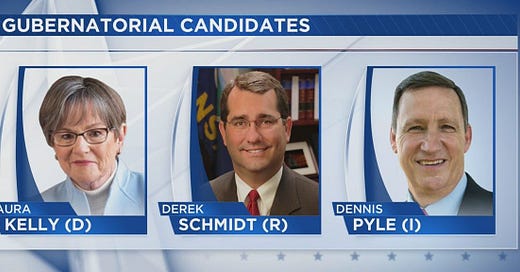How might 1.5 million "educational" mailings in Kansas have affected the Kelly-Schmidt gubernatorial contest?
The Voter Participation Center and Center for Voter Information non-profits flooded some voters with "educational" mailings in 2022
Last year related groups, Voter Participation Center and Center for Voter Information, mailed over 85.5 million election-related “educational” pieces to voters in 32 states.

Kansas was one of those states, and one of the states receiving over a million pieces from these groups.
Could 1.5 million election-related “educational” mailings impact an election in Kansas? Have mailings from these groups affected past elections in Kansas?
2022
The 2022 Kansas gubernatorial contest between Laura Kelly and Derek Schmidt was close, especially with the candidacy of Republican-turned-Independent Dennis Pyle.
Official election results show Gov. Kelly won over former Attorney General Schmidt by a mere 22,258 votes.
How many of those 22,258 winning votes for Kelly might be explained by the mailing of 1.5 million pieces to Kansans by the Voter Participation Center (VPC) and the Center for Voter Information (CVI)?
All four waves of mailings by VPC/CVI greatly exceeded the margin of Gov. Kelly’s victory, which are summarized in the table below.
An article by Hayden Ludwig from the Capital Research Center explains how targeted “nonpartisan voter registration” can result with “netting Democratic votes,” which is the very thing the IRS instructs nonprofits to avoid.
Summary of VPC/CVI Mailings to Kansans

The first mailing delivered by March 17 was “aimed at registering any eligible unregistered voters” including “individuals who have just turned 18 and become eligible to vote and to voters who have recently moved.”
The second mailing delivered by August was aimed at “potential voters in the New American Majority – people of color, young people, and unmarried women.”
The September mailing focused on “vote-by-mail applications to registered voters in the New American Majority who are not very likely to vote in the 2022 general election.”
The fourth wave of mailings was “get-out-the-vote” targeting “the New American Majority - people of color, young people, and unmarried women.” The numbers above suggest CVI sent on average two mailings to every voter, while VPC sent on average three mailings in this fourth wave.
More details about these mailings to 32 states can be found in the national article about VPC/CVI mailings in 2022.
Example 2022 mailings
Both VPC and CVI have registered with the Kansas Attorney General’s Charitable Organization Registry, and show the same address: 1707 L Street NW, Suite 700, Washington, DC 20036.
Neither VPC nor CVI has registered as a Kansas business entity with the Kansas Secretary of State.
But to make recipients of their mailings think they are operating in Kansas, VPC and CVI show a Topeka return address. This address is for a US Post Office box in Topeka.

VPC is a 501(c)(3) non-profit (think “education”) and CVI is a 501(c)(4) non-profit (think “advocacy and lobbying”). These non-profits file yearly IRS 990 tax forms, which are public documents revealing their expenditures, but usually nothing about their contributors.
Such non-profits make no campaign finance filings with the Kansas Governmental Ethics Commission nor the Federal Election Commission.
As non-profits their publications can never say “vote for” or “vote against” any candidate, but a careful selection of questions with answers, which are not necessarily accurate, can steer targeted voters to the candidates desired by the non-profits.
Two examples of CVI “push surveys” follow.

A search of the Internet shows one Kansas voter thought such mailings should be illegal.

I cannot prove how the number of mailings and “push surveys” might have affected the governor’s race, but what do you think? Could 1.5 million mailings affect an election in Kansas?
2020
Detailed VPC/CVI mailing counts for 2020 are not known to exist, but legal documents in a federal lawsuit give clues.

The legal documents said VPC sent 1.2 million advance voting applications to Kansas voters in 2020.
VPC claims 69,577 of these voters submitted the advance voting applications. These numbers show only about 6% responded, but that is still a sizable number of voters in Kansas. The process may be inefficient, but still achieves a desired goal of VPC/CVI.
2018
In the lawsuit cited above, VPC said in 2018 they sent 90,000 advance mail voting applications to Kansas voters and 5,342 completed and mailed those applications. Again, this is only about a 6% response rate.


Details about VPC / CVI mailings in 2018 are not known.
Congresswoman Sharice Davids’ winning margin was nearly 31,000, so it’s unclear how large an impact the VPC / CVI mailings were in 2018.
Election Integrity?
Should such large mailings from out-of-state organizations with such little transparency be an issue to Kansans concerned about election integrity?
Should non-profits be more regulated when they are clearly taking part in the election process of candidates?
Are non-profits fair in their use of “push surveys”?
Related
VPC and CVI overwhelmed Kansas and a number of other states in 2022 with “educational” political mailings.
See additional example mailings from VPC and CVI from various states, including Kansas, Michigan, Mississippi, Pennsylvania, Virginia as well as news stories about problems caused by these mailings for election offices.
Why did the national group “Protect Democracy” buy Kansas voter data 68 times from 2020 through 2022?
Dennis Pyle captured about 2% of the vote in the 2022 Kanas governor’s contest, but his support varied considerable across the state.











